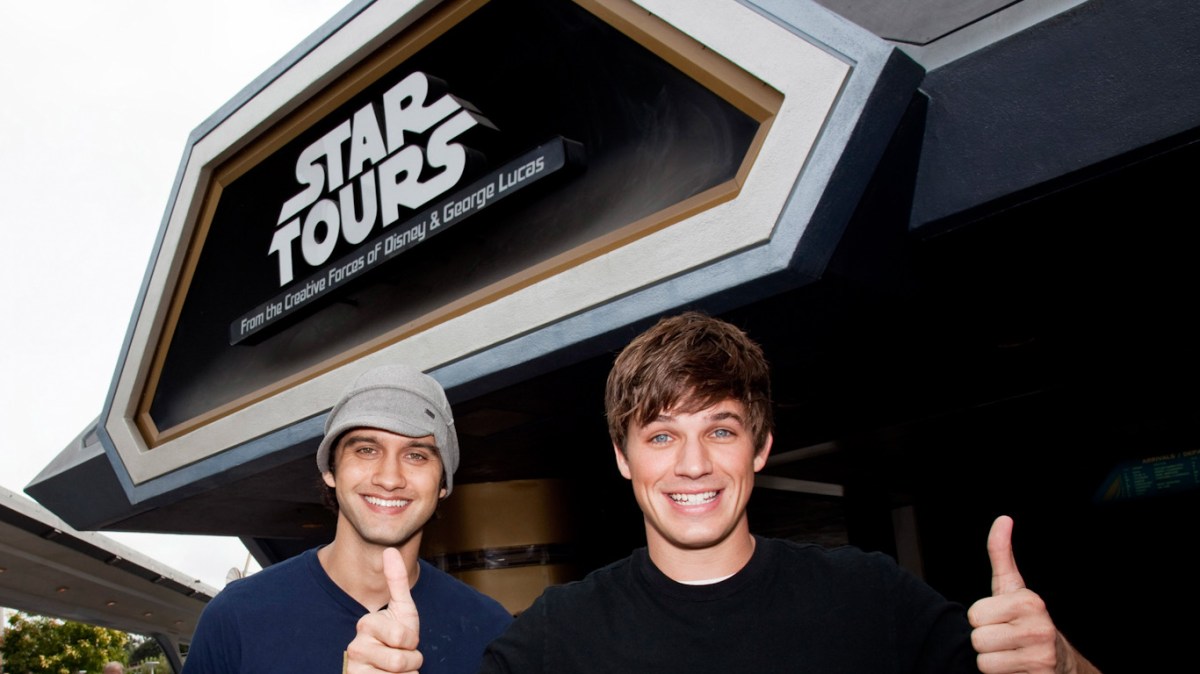In 1987, Disneyland opened the first ever Star Wars theme attraction in the world, but the journey to get there had more twists and turns than the Millennium Falcon in an asteroid field. Here’s the brief story of how Disneyland’s Star Tours came to be.
In a surprisingly under-the-radar episode of the 2021 Disney Plus series Behind the Attraction appropriately titled “Star Tours,” the behind the scenes story of the Star Wars attraction is revealed. It was the 1980’s and Disneyland decided they wanted to make a ride out of their 1979 space adventure movie hit The Black Hole.
However, The Black Hole, although an interesting movie, is not extremely family-friendly.
They put their creative engineering minds at work on The Black Hole project. Those workers, better known at Disney as “Imagineers,” included Tony Baxter, who would oversee some of the biggest projects at Disneyland in his 47-year career. Baxter realized that The Black Hole wasn’t exactly as much of an adventure as it was a really strange yet successful movie. “When you create a ride based on a movie,” Baxter explained in the episode, “it has to be one that the audience dearly loves.”
Baxter decided to share such an opinion with then Disney CEO Ron Miller, actually telling him, “Some of the (Disney) films recently have not connected with the audience and are not crowd-pleasers.”
That’s usually not what a CEO wants to hear, but Miller listened and eventually realized that, at least in regards to making an attraction out of The Black Hole, Baxter was right.
They realized they likely needed to consider building a space adventure attraction based on a movie that’s not Disney related. That would be the first time such a consideration was made and, of course, the Star Wars franchise immediately came to mind. So, Disney reached out to George Lucas who was delighted at a Star Wars roller coaster idea.
That’s when things would change again.
Initially, Baxter had ideas for the roller coaster to give its riders control over which way the roller coaster would go at certain choice points in the ride. However, the idea became complicated, and the Imagineers couldn’t pinpoint exactly what the ride should be.
So, George Lucas visited the Disney headquarters in Glendale, California to talk things over and spotted something in the hallway of the offices that immediately made him realize what the Star Wars attraction had to be.
What was it?
Well, let’s back up a bit.
As Baxter explains in the episode, “By complete coincidence, Randy Bright, who worked in the film end of Imagineering had just come back from England and while he was over there someone said, ‘Hey, you guys are into rides and all that stuff. You should go and see this industrial company called Rediffusion.’”
It sounded interesting, so Bright visited the company and realized the ride he was told about was actually a motion-based simulator that was used for training pilots, both commercial and military. The pilot would sit in the mock cockpit and the simulator would move about 15 feet in all directions, simulating the motion of the airplane that the pilot was controlling. Bright thought the technology was interesting so he brought the idea back to Disney and drew up some storyboards of what some potential sites or adventures can be used as visuals for the simulators if Disney were ever to decide turn it into a ride.
Those storyboard were hung up on the wall at the offices, seemingly as an idea in progress, and that’s what caught George Lucas’ eye. When it was explained to him what it was, Lucas said, “I think that might be an interesting thing for Star Wars.”
At that moment, all other ideas for the theme ride were abandoned and Disney Imagineers, including Baxter, took a trip to London to meet with Rediffusion and it would be the beginning of the creation of the first Star Wars motion simulator ride.
When completed, 40 fans would be able to sit in the ride simultaneously as if it were a transport ship in Star Wars that acted like a bus ride in flight to another planet. The story that developed for the ride was that the transport finds its way into the Death Star battle that concludes the Star Wars — Epsiode IV: A New Hope. Later versions of the ride were updated to accommodate the prequels. The story changed and was then about Darth Vader showing up because a rebel spy was onboard the ship. So, the transport got out of trouble by jumpping to hyperspace but, without a chance to set the coordinates, they travel at light speed to somewhere random.
Those randomized elements help the ride have 54 different possibilities with one thing leading to another which all but assures that visitors to the ride would have a unique experience every time they went.
This overall Star Tours attraction lasted for 23 years until Disney closed it in 2010 to create something new for Star Wars — officially called Star Tours the Adventure Continues — which features a popular area known as Galaxy’s Edge. There, instead of riding a transport, fans can actually fly the Millenium Falcon. I would definitely call that quite the upgrade.
What if Tony Baxter never had the nerve to tell Disney’s CEO that The Black Hole ride was a bad idea? What if that CEO didn’t listen to such an opinion?
Disneyland’s immediate future likely wouldn’t include a story from “a long time ago,” if not for such realizations and it certainly wouldn’t be as successful an attraction as Star Tours is.

